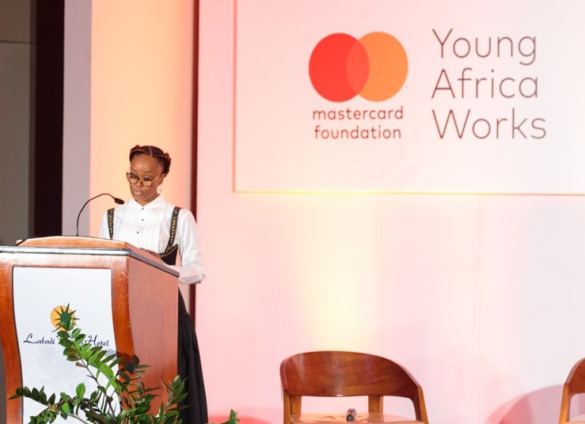The Design and Technology Institute (DTI) in collaboration with the National Development Planning Commission (NDPC) has held a multi-stakeholder dialogue to commence the development of a national policy for precision quality training in Ghana.
The organistations believe that with Ghana’s youthful population, the country will obtain great opportunities should it fully harness the human resources.
As such, establishing a National Precision Quality Policy is expected to create thousands of sustainable jobs and work opportunities for young Ghanaian women and men.
The consultative conference which was held under the theme “Unlocking the Skills and Competencies of Young People for Quality Jobs in Ghana and the Globalized Labour Market” brought together key state and non-state stakeholders including the Ghana Standard Authority (GSA), Commission for Technical and Vocational Education and Training (CTVET), Association of Ghana Industries (AGI), academia and Master Craft Persons to provide input into a national policy on precision quality as a key component of the TVET education in Ghana.
The conference also saw stakeholders from the fields of construction, design, the medical sector, digital skills and artificial intelligence and the clothing industry share their views on the role precision quality played in their respective fields and how a national policy would stimulate youth employment in diverse fields.
They made a clear case for public private partnerships to advance training and skills development for young people.
As part of the conference, participants were taken through the findings of a baseline research commissioned by DTI to help gather relevant data on the State of TVET education in Ghana.

Speaking at the event, Chief Executive Officer of DTI, Constance Elizabeth Swaniker commended the Mastercard Foundation for their immense role in the implementation of the PQ programme and other stakeholders for their tremendous support so far for the soon-to-be-developed National Policy on Precision Quality.
She said, “We will continue to engage with all stakeholders in our collective effort to support the national agenda in addressing the skills gap challenge facing academia and industry and provide the basis for the creation of sustainable jobs for the youth through TVET programmes. We look forward to the kind of collaboration fostered through this conference as we shape and create a national policy on PQ Training for Ghana”.
On his part, Director-General of NDPC, Dr Kodjo Mensah-Abrampa stated that skill development constraints identified are the limited number of skilled industrial personnel and the mismatch to industrial needs.
“Our proposals for the medium-term would be to ensure improved skills development for the industry by transforming the apprenticeship training model from a supply-driven approach to a market-demand model. These would help consolidate our gains in skills training and position our youth for the future of work,” he said.
The Minister for Employment and Labour Relations, Ignatius Baffour-Awuah in his address was emphatic that one sure way to facilitate the development agenda of the nation is to have a highly skilled and strongly motivated labour force.
He indicated that the Covid-19 pandemic has accelerated the process for nations and organisations to plan and prepare for the future of work, to ensure that they have people with the requisite skills and knowledge to produce world-class goods and services.
“The widespread adoption of precision quality in training and practice of our skilled labour would greatly contribute to value addition of the Ghanaian labour force and raise the quality of local products and services to international standards", he said.
As part of the programme, several activities have been initiated among key stakeholders to tackle issues of precision quality in service delivery in Ghana.
The conference forms part of a three-year “Transforming youth TVET livelihoods for sustainable jobs’’ partnership between DTI and the Mastercard Foundation, as part of the Foundation’s Young Africa Works strategy in Ghana.
This seeks to provide 40,000 direct and indirect work opportunities for young people in the country.
Meanwhile, the development of a national policy for precision quality launched in Ghana would integrate the CTVET accredited precision quality curriculum into the learning outcomes of senior high schools, technical universities and workshops of Master Craft persons ensuring standardisation across board.
A national policy on precision quality would also ensure that students and apprentices are assessed by experts for certification, after completion of course modules, to provide the basis for hiring and inform salaries and benefits as well as promotions and career progression.
And create a system that empowers the public to demand quality goods and services from artisans and other industry players to drive compliance and quality of service.
Latest Stories
-
Livestream: The Law discusses Article 146 – prima facie
23 minutes -
Appeal Court judge slams weak enforcement of Land Act as land disputes dominate court cases
1 hour -
Police arrest two suspects for robbery at Ashaiman
1 hour -
Fire ravages apartments, stores at Akyem Kwabeng
1 hour -
Tano Anwia’s concession owner teams up with Forestry Commission to combat galamsey
2 hours -
Gov’t allocates GH₵490m to Education Ministry
3 hours -
Tragedy: Nigerian boxer dies after Ghana Pro League bout
3 hours -
Opoku-Agyemang undergoes treatment at UGMC, set to receive further care abroad
6 hours -
The mystery of Bomigo: an island of divine laws, sacred goats, and unwavering traditions
8 hours -
Government’s GH₵ 292.4 million mistake: why free sanitary pads are the problem, not the solution
8 hours -
Crystal Palace beat Fulham to book FA Cup semi-final spot
17 hours -
Forest beat Brighton on penalties to reach FA Cup semi-final
17 hours -
MTN FA Cup 2024/25: Berekum Chelsea book semis slot with win over Bechem United
17 hours -
Gov’t promoting galamsey with GoldBod; the GoldBod is galamsey board – Minority
18 hours -
Ghana Navy probes suspected pirate attack on fishing vessel
19 hours

